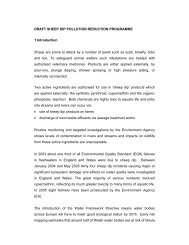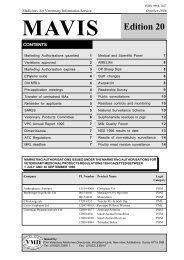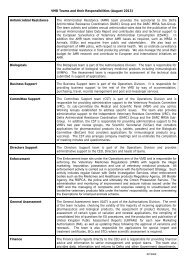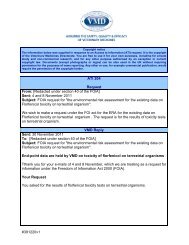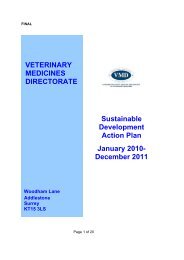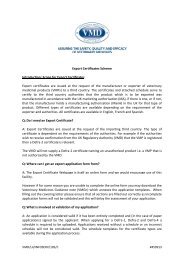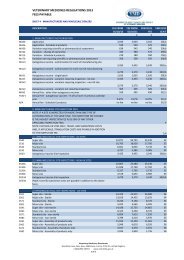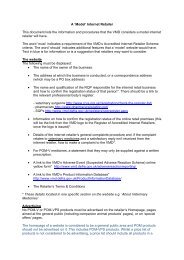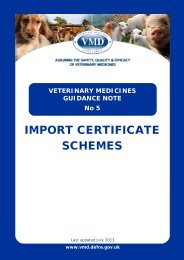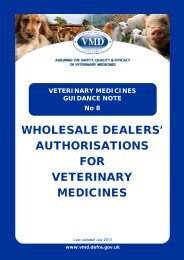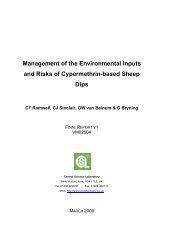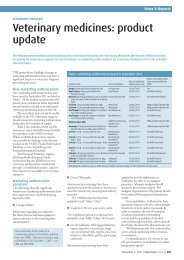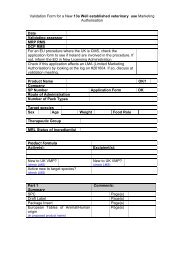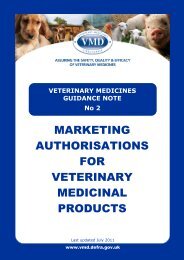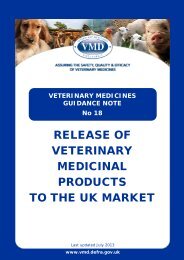VETERINARY MEDICINES GUIDANCE NOTE No 3
VETERINARY MEDICINES GUIDANCE NOTE No 3
VETERINARY MEDICINES GUIDANCE NOTE No 3
Create successful ePaper yourself
Turn your PDF publications into a flip-book with our unique Google optimized e-Paper software.
VMGN <strong>No</strong> 3<br />
Out of date products<br />
64. It is illegal to supply a product after the expiry date, as detailed on the pack, has<br />
passed. Any such product should be disposed of in accordance with the wording on<br />
the product literature. Some products (for example injectables) must be discarded<br />
within 28 days after opening and this will be stated on the packaging. This is due to<br />
requirements in the EU and national legislation to ensure the stability and safety of<br />
the product. In these cases the expiry date becomes the 28 th day after opening,<br />
unless the original expiry date is shorter.<br />
Emergency wholesale supply between Authorised retailers<br />
65. An authorised retailer of veterinary medicines may supply such products, which fall<br />
within the scope of the qualification they hold, to another authorised retailer, in order<br />
to relieve a temporary, supply shortage that could be detrimental to animal welfare.<br />
This derogation is intended to prevent animal welfare problems associated with lack<br />
of availability of medicines and not intended to aid commercial activities.<br />
66. Only the Manufacturer of a VMP or a holder of a Wholesale Dealer‟s Authorisation<br />
(WDA) may routinely supply authorised retailers with veterinary medicines. For<br />
further information please refer to VMGN 8 Wholesale Dealer‟s Authorisations for<br />
Veterinary Medicines, which is published on the VMD‟s website.<br />
http://www.vmd.defra.gov.uk/pdf/vmr11/VMGN08.pdf<br />
Supplying medicines for horses<br />
67. RQP supplying veterinary medicines for horses need to advise the customer whether<br />
or not the product dispensed is suitable for use in food producing horses. This is to<br />
allow horse keepers to fulfil their obligations regarding the Horse Passport<br />
Regulations. For further information please refer to VMGN 16 Guidance on Horse<br />
Medicines and Horse Passports, which is published on the VMD‟s website.<br />
http://www.vmd.defra.gov.uk/pdf/vmr11/VMGN16.pdf<br />
Importation of veterinary medicines<br />
68. It is an offence to import a VMP not authorised for use and to supply such a VMP in<br />
the UK, unless it is supplied under the prescription of a veterinary surgeon and with a<br />
suitable import certificate. For further information please refer to VMGN 5 Import<br />
Certificates Scheme, which is published on the VMD‟s website.<br />
http://www.vmd.defra.gov.uk/pdf/vmr11/VMGN05.pdf<br />
Export of veterinary medicines<br />
69. The VMR do not restrict the export of veterinary medicines. If the export is within the<br />
European Union (EU) the Responsible person exporting the medicine must ensure<br />
that the product can legally be sold or supplied in the importing Member State.<br />
70. If the product is to be exported outside of the EU the VMD recommends checking the<br />
requirements for import in the country concerned. For products manufactured or<br />
marketed in the UK the VMD can issue an Export Certificate at the request of the<br />
manufacturer or exporter of the VMP. They serve to certify that the product which is<br />
to be exported out of the EU was manufactured in accordance with a UK Marketing<br />
Authorisation, if there is one, or if not, that the manufacturer holds a manufacturing<br />
authorisation in the UK for that type of product. For further information please refer to<br />
VMGN 19 Export Certificates Scheme, which is published on the VMD‟s website.<br />
http://www.vmd.defra.gov.uk/pdf/vmr11/VMGN19.pdf<br />
17



